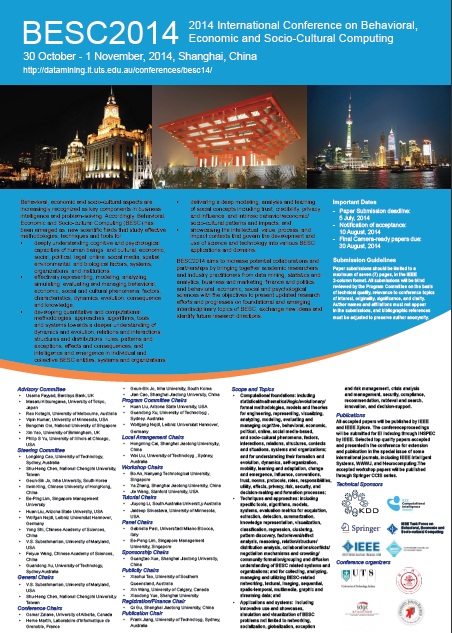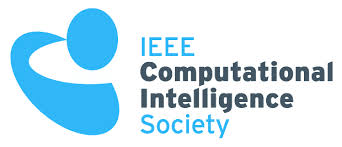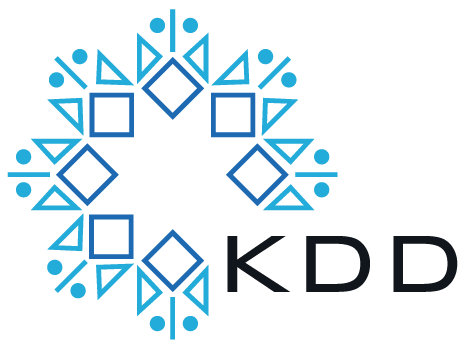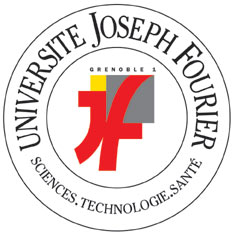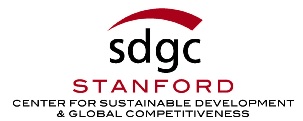BESC – S1: Social Media Analysis
Chair: Huan Liu, Arizona State University, USA
Link Formation in Undergraduate Students Friendship Network
Kun Zhao
On the Importance of Considering Social Capitalism When Measuring Influence on Twitter
Maximilien Danisch, Nicolas Dugué and Anthony Perez
Social Network of the Competing Crowd
Kai Lu, Wenjun Zhou and Xuehua Wang
A Model to Measure Inter-communication between Segregated Communities
Hussein Mohsen
Discovering Evolving Political Vocabulary in Social Media
Aravindan Mahendiran, Wei Wang, Jaime Arredondo, Bert Huang, Lise Getoor, David Mares and Naren Ramakrishnan
BESC – S2: Micro-blogging and Mobile Networks
DSAA – SS8: Computational Intelligence and Applications in Big Data Analysis
Chair: Hung-Yu Kao, National Cheng Kung University, Taiwan
Investigating Sentiment Impact on Information Propagation and its Evolution in Microblog
Zhitao Wang, Zhiwen Yu, Zhu Wang and Bin Guo
Times Makes Heroes or Heroes Shape Their Times? The Emotion Relationship between Elites and Masses on Micro-blogging
Kaisheng Lai, Hao Chen, Limin Qi, Weining Qian and Aoying Zhou
Observation of Tolerance in Dynamic Social Networks Using Mobile Phone Data
Yu Zhang
An Approach for Discovering User Similarity in Social Networks Based on the Bayesian Network and MapReduce
Juan Xu, Kun Yue, Jin Li, Feng Wang, Weiyi Liu
Finding Associations-between-Groups in Multimode Networks (SS8: CIABDA)
Hongmei Chen, Qing Xiao, Dandan Zhang, Lizhen Wang, Lihua Zhou (SS8: CIABDA)
BESC – S3: Machine Learning & Optimization
Chair: Osmar Zaiane, University of Alberta, Canada
Sentiment Analysis Based on Transfer Learning for Chinese Ancient Literature
Huidong Zhao, Bin Wu, Haoyu Wang and Chuan Shi
Maximum Likelihood Estimation Based DINA Model and Q-matrix Learning
Yuan Sun, Shiwei Ye, Huiyang Shi, Haobo Wang and Yi Sun
Bivariate Probability-Based Anomaly Detection
Hua Lou and Ye Zhu
Value Estimates of Water Quality Improvement Using the Double Bounded Dichotomous Choice
Zhijian Cai, Liyong Du, Zhan Jiang, Ling Zhang and Jiameng Yang
BESC – S4: Complex Network Analysis
Chair: Xin Wang, University of Calgary, Canada
Context Specific Entity based Modeling of Organizational Structures
Johannes Schick, Martin Kuboschek and Wolfram-Manfred Lippe
Six Types of Terrorist Networks
Fatih ?zgül and Chris Bowerman
Trends and Behavior of Developers in Open Collaborative Software Projects
Mohammad Allaho and Wang-Chien Lee
Understanding the Evolutionary Dynamics and Adaptation of Complex Networks
Alireza Abbasi
BESC – S5: Behavior and Economics
Chair: Antoaneta Serguieva, University of College London, UK
Geometric Brownian Motion with Itō’s Lemma Approach to Evaluate Market Fluctuations: A Case Study on Colombo Stock Exchange
R.M. Kapila Tharanga Rathnayaka, Wei Jianguo and D.M.K.N Seneviratna
Estimating the Incremental Effects of Interactions for Marketing Attribution
Ritwik Sinha, Shiv Saini and Anandhavelu Natarajan
Discrimination of China’s Stock Price Manipulation Based on Primary Component Analysis
Fengzhao Yang, Hang Yang and Menghan Yang
Trading Volume, Realized Volatility and Signed Jump: Evidence Form China’s Stock Market
Tao Bi and Gong Cheng
The effect of finance leasing efficieny on the agency cost
Xiao Wang
BESC – SS1: BEBD Behavior, Economics & Big Data
SS3 ACEE: Agent-based Computational Economics and Experimental Economics
Chair: Tong Zhang, Southwestern University of Finance and Economics, China
Research on the Factors of Transfer Pricing of Chinese Enterprises
Hui Cheng and Zhanxia Wu
The Automatic Indexing of Cooking Video by Using Caption-Recipe Alignment
Kyeong-Jin Oh, Myung-Duk Hong, Sang-Yong Sim and Geun-Sik Jo
Formation of Tectonic Wave Networks: Dynamics of the Mexican Payment System Structure
Biliana Alexandrova-Kabadjova, Antoaneta Serguieva and Liliana Garcia-Ochoa
Supply Uncertainty in Commodity Contracting – An Agent-based Model
Tong Zhang and Yu Wu
Heterogeneity in Experienced-Weighted Attraction Learning and Its Relation to Cognitive Ability
Shu-Heng Chen and Ye-Rong Du
A Method to Identify the AVI-type Blocks Based on Their Four-character Codes and C4.5 Algorithm
Jun Pan, Liying Liu, Guozi Sun and Yanbin Tang
BESC – SS2: KACADMSS Knowledge Acquisition, Causality Analysis and Data Mining in Social Systems
Chair: Ting Wang, China University of Politics and Law, China
A Meta-Ontology for Knowledge Acquisition and Exploitation of Collaborative Social Systems
Matthieu Lauras, Frédérick Bénaben, Sébastien Truptil, Lamothe Jacques, Guillaume Mace Ramete and Aurélie Montarnal
Friend Recommendation of Microblog in Classification Framework: Using Multiple Social Behavior Features
Siyao Han and Yan Xu
Application of Supervised Learning in the Exploring Research on Employment Quality for College Graduates
Ting Wang
Comuptional Reasoning and Learning for Smart Manufacturing under Realistic Conditions
Shuhui Qu, Raymond Jian, Tianshu Chu, Jie Wang and Tian Tan
Secrets of Success: Innovation in the Silicon Valley
Ting Wang, Ling Wang and Tiffany Chen
Tutorial 1: Network Mining and Analysis for Social Applications
Lecturer: Feida Zhu
Date: November 1, 2014, 13:20 – 15:20
Room: East Asia Hall, B/F
Abstract:
The recent blossom of social network and communication services in both public and corporate settings have generated a staggering amount of network data of all kinds. Unlike the bio-networks and the chemical compound graph data often used in traditional network mining and analysis, the new network data grown out of these social applications are characterized by their rich attributes, high heterogeneity, enormous sizes and complex patterns of various semantic meanings, all of which have posed significant research challenges to the graph/network mining community. In this tutorial, we aim to examine some recent advances in network mining and analysis for social applications, covering a di- verse collection of methodologies and applications from the perspectives of network patterns, relationship mining and identity linkage. We would present the problem setting, the research challenges, the recent research advances and some future directions for each perspective.
Bio:
Feida Zhu is an assistant professor at the School of Information Systems of SingaporeManagement University (SMU). He has founded and managed as Academic Director the Pinnacle Lab a joint lab with China Ping An Insurance Group to focus on social media mining and analysis for finance innovation. He obtained his Ph.D. in Computer Science from the University of Illinois at Urbana-Champaign (UIUC) in 2009. His current research interests include large-scale data mining, graph/network mining and social network analysis. His research on large-scale frequent pattern mining has won the Best Student Paper Awards at 2007 IEEE International Conference on Data Engineering (ICDE) and 2007 Pacific- Asia Conference on Knowledge Discovery and Data Mining (PAKDD)
Tutorial 2: Harvesting, Integrating, Maintaining and Leveraging Knowledge Graphs
Lecturer: Seung-won Hwang
Date: November 1, 2014, 15:40 – 17:40
Room: East Asia Hall, B/F
Abstract:
Knowledge graphs have served as an integral component of modern search engines and software in general. However, it is non-trivial to harvest, cleanse, and integrate web-scale knowledge graphs, which has been actively studied in diverse fields of computer science. This two-hour tutorial will cover recent work on broad issues of harvesting, integrating, maintain, and leveraging knowledge graphs.
Bio:
Seung-won Hwang is an associate professor of computer science and engineering in POSTECH, Korea. Her recent research projects have been integrating multiple knowledge graphs for data-driven understanding of entities. Her recent findings have been published at database and NLP venues, including ACL, TKDE, TOIS, TODS, SIGMOD, VLDB, and ICDE.
